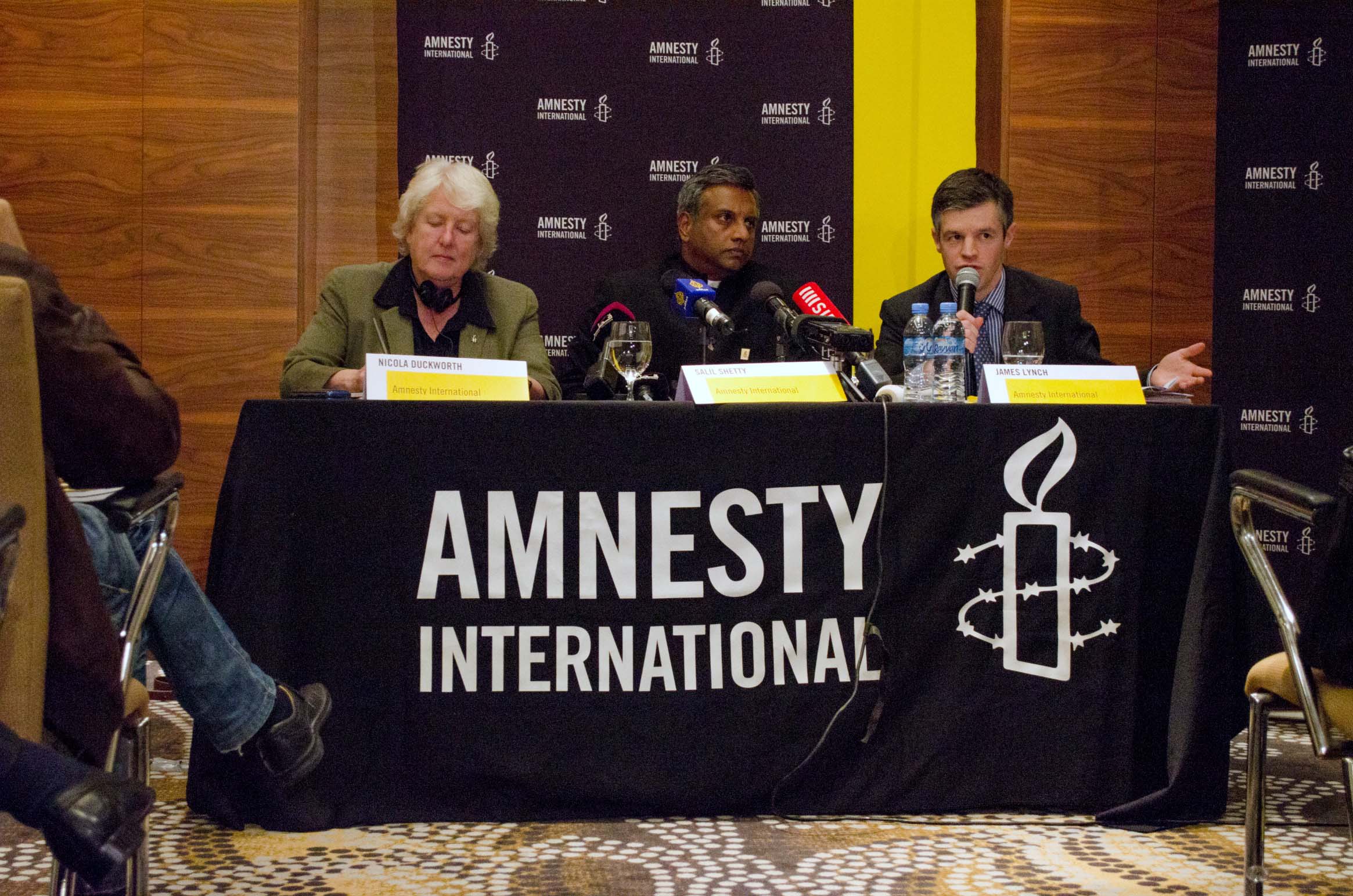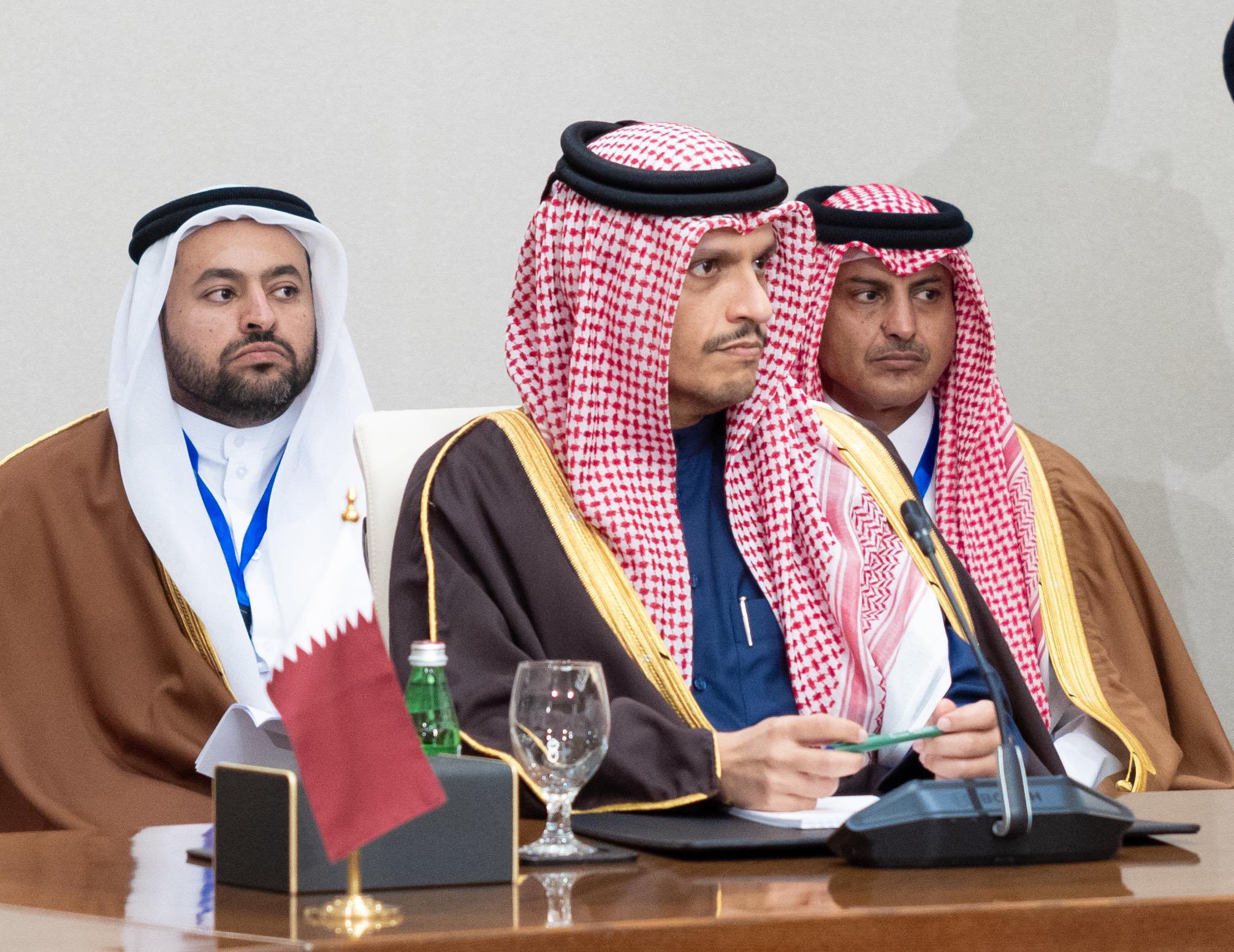
The rampant abuse of migrant workers is reaching “crisis” proportions in Qatar and requires urgent action, a senior Amnesty International official has said, hours before the release of a report detailing the abysmal living and working conditions of many of the country’s poorest residents.
Speaking at a press conference in Doha on Sunday, Amnesty’s secretary general Salil Shetty said withheld passports, unpaid wages and poor worksite safety were among the top concerns detailed in the new report, which journalists were only permitted to publish after midnight on Sunday.
The Dark Side of Migration, a 169-page document that draws on interviews with more than 200 male construction workers in Qatar and 14 meetings with government officials, echoes many of the same concerns as previous reports from rights groups. But it also works to debunk the simple narrative of Qatari nationals taking advantage of foreigners.
Instead, the report asserts that exploitation is happening because companies can get away with it.
Namely, “serious flaws” in local laws, a permissive environment and lax enforcement of existing policies governing the recruitment and employment of migrant workers are enabling “widespread” abuse of construction workers by both Qatari and foreign business owners, the report said.
In his opening remarks, Shetty said Qatar has been much more open and accessible to Amnesty than some of its Gulf neighbours, and praised government officials for acknowledging that problems exist and taking steps to address the issues.
“Nobody (in the government) was denying that there was a problem,” he said.
But he added: “While they’ve come a distance, there is still a long way to go.”
Gathering information
Amnesty researchers spent five and a half weeks in Qatar over two visits preparing their report. They visited 20 labor camps and said they observed breaches of Qatari standards in each one, including observing 15 men sharing a bedroom, missing or non-functioning air conditioning, overflowing sewage as well as a lack of power and running water.
Enabling these abuses, Amnesty said, is Qatar’s sponsorship systems that creates an “excessively unequal power relationship:”
“When combined with ineffective enforcement of worker protection, the sponsorship law means that people can be compelled to work under exploitative conditions, when they would otherwise be able to resign and get a new job or leave the country.”
The report also noted that while researchers encountered many workers in severe psychological distress, including several who expressed suicidal thoughts, they also spoke to others who were broadly satisfied with their working conditions.
Amnesty’s recommendations mirror those made by other human rights and labor activists in the past few years – primarily, calling on Qatar to scrap its restrictive sponsorship (kafala) system and do away with rules that require expats to obtain their employer’s permission to change jobs or leave the country.
“There is no reason, in our view, why (a blanket exit permit system) should continue,” Shetty said.
VIDEO: Amnesty International says legal framework “facilitates exploitation” of migrant workers
Amnesty researcher James Lynch added that a travel ban system is already in place to prevent those with pending court cases from leaving the country.
However, representatives of Qatar’s business community have argued that the current rules are needed to prevent hardships to companies caused by the sudden and unannounced departure of key employees.
The upcoming 2022 World Cup – which is expected to require 1.5 million additional workers and billions of dollars worth of new construction projects – has many international news outlets scrutinizing Qatar’s human rights record. Amnesty is capitalizing on that media spotlight and encouraging Qatari officials to see that attention as “an opportunity to reform a system that everyone acknowledges needs reforming,” Shetty said.
What’s new
Amnesty’s report contains a wealth of highly detailed anecdotes of abuse that build upon past publications by the United Nations, international trade union BWI and the Guardian newspaper, as well as Human Rights Watch.
But the report also contains a lot of fresh information, including:
- More details about a 2013 study by Hamad Hospital that found more than 1,000 workers are injured annually after falling from heights at work sites. The mortality rate is “significant” and 10 percent of victims were disabled after the incident. The Hamad Hospital report is quoted as saying:
“There were a high number of injuries affecting head and spine, and a comparatively low number of injuries to the lower extremities. This suggests that injured workers are falling mainly on their heads. The implementation of helmets or other protective headgear and safety barriers or restraint devices for construction workers at risk of falling may lead to significant reduction of injuries.”
The Hamad Hospital study also noted that the rate of fatal falls in the construction industry in the United Kingdom was 3.4 per 100,000 workers in 2007-08. During a similar time period in Qatar, it was 8.44 per 100,000 workers.
- Allegations from former employees of Krantz Engineering, a subcontractor hired by SEG Qatar to work on the Ras Laffan Emergency and Safety College for Qatar Petroleum, that they were forced to sign papers falsely stating that they had received their salaries before the company returned their passports. The workers told Amnesty they were also forced to sign and add a thumbprint to two blank letterheads, something Indian embassy officials called “blackmail” in a strongly worded letter to Krantz.
This followed long delays in paying wages as well as a failure to issue or renew expired residence permits, meaning these workers could not leave Qatar until large fines for living here illegally were paid to the Ministry of Interior. Krantz officials – who could not immediately be reached for comment by Doha News – told Amnesty researchers that the firm encountered financial problems when SEG did not pay the subcontractor.
- A construction company called PCSI Specialties Qatar – which has been subcontracted by Hyundai Engineering and Construction Co. to work on the Hamad Medical City project, and by OHL Construction and Contrack for Qatar Foundation’s Sidra Medical and Research Center – failed to arrange for residence permits to be issued and renewed for dozens of employees, workers say. Amnesty researchers say a PCSI general manager told them that the issue stemmed from cash-flow problems and acknowledged that “one or two” of its workers had been arrested and deported for not carrying permits.
Amnesty officials also visited a PCSI labor camp, where workers told them that the air conditioners had been broken for 10 months. Furthermore, the accommodations were also being used to house old paints and waste materials, with discarded electrical cables and what appeared to be spilled oil left in the corridors.
- Dozens of employees at Indian Trading and Contracting Group – as well as Bestway Qatar and Noor al Huda Trading and Contracting, two firms contracted to supply construction workers – said they performed four months of unpaid work on an Al Sadd tower (the exact location of which they could not recall) between July and December 2012. They also say they did not collect any wages for several months afterwards when they were stranded in Qatar, unable to work or leave.
Amnesty said it saw documents to support the men’s claims and spoke to ITC’s managing director, who said the company was experiencing financial difficulties because of a payment dispute with a client. Amnesty also visited their labor camp on Street 38 in Doha’s Industrial Area. There was no power or running water, and sewage leaking from the camp’s septic tank flowed down the street into a stagnant pool.
During Sunday’s press conference, Amnesty officials conceded that the claims of financial difficulties on the part of subcontractors could be true and constrain their ability to pay workers and utility bills.
Nevertheless, Lynch said he found the attitudes of company officials “shocking” and said many treated labor laws as an optional set of guidelines.
Anecdotally, Amnesty researchers documented one meeting with the manager of a subcontracting company in which they referenced correspondence from the company’s mainly Nepalese employees. The manager, apparently believing that no one from Amnesty spoke Arabic, phoned one of his colleagues and asked him to “Bring me the letter from the animals.”
Amnesty officials say it is up the primary contractors to include, monitor and enforce human rights provisions in their agreements with subcontractors.
An unnamed source from the Ministry of Foreign Affairs told QNA that Qatar would be investigating the claims in Amnesty’s report, as part of an independent review launched last month following the Guardian report about Nepali workers. The source also said:
“The State of Qatar attaches great importance to promoting and protecting human rights within the state by acting to consolidate these rights in its legislations and laws as well as establishing the appropriate institutions for the protection and promotion of these rights, reiterating that it is doing its utmost in this respect.”
Amnesty expects to release another report, focused on domestic workers in Qatar, sometime next year.
Read the full report here:
Thoughts?







